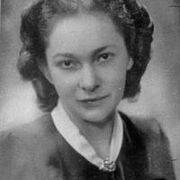Magda Szabó (1917–2007)
Author of The Door
About the Author
Disambiguation Notice:
The native Hungarian form of this personal name is Szabó Magda, so the Legal lastname, firstname name is Magda, Szabó. The Western (including English) Canonical lastname, firstname name is Szabó, Magda.
Image credit: goodreads
Works by Magda Szabó
A Balada De Iza 4 copies
Béla Király 1 copy
Căprioara 1 copy
YAVRU CEYLAN 1 copy
Saaresinine : [jutustus] 1 copy
Řekněte Žofince 1 copy
Ballo in maschera 1 copy
Paulan tähden 1 copy
Eleven képét a világnak 1 copy
La porta 1987 1 copy
Dyrnar 1 copy
Ki hol lakik? 1 copy
Associated Works
Tagged
Common Knowledge
- Canonical name
- Szabó, Magda
- Legal name
- Magda, Szabó
- Birthdate
- 1917-10-05
- Date of death
- 2007-11-19
- Gender
- female
- Nationality
- Hungary
- Country (for map)
- Hungary
- Birthplace
- Debrecen, Hungary
- Place of death
- Kerepes, Hungary
- Places of residence
- Debrecen, Hungary
- Education
- University of Debrecen, Hungary
- Occupations
- writer
teacher
novelist
poet
essayist
translator - Relationships
- Szobotka, Tibor (husband)
- Awards and honors
- Baumgarten-díj (1949, visszavonták)
József Attila-díj (1959, 1972)
Kossuth-díj (1978)
Pro Urbe Budapest díj (1983)
Debreceni Református Teológiai Akadémia díszdoktora (1993)
Déry Tibor-jutalom (1996) (show all 15)
Szép Ernő-jutalom (1998)
Nemes Nagy Ágnes-díj (2000)
A Miskolci Egyetem tiszteletbeli doktora (2001)
Corvin-lánc (2001)
Gundel Művészeti Díj (2003)
Prima Primissima díj (2003)
Femina-díj (2003)
Hazám-díj (2007)
A Magyar Köztársasági Érdemrend nagykeresztje (polgári tagozata) (2007) - Short biography
- Magda Szabó (October 5, 1917 – November 19, 2007) was a Hungarian writer, arguably Hungary's foremost woman novelist. She also wrote dramas, essays, studies, memories and poetry.
Born in Debrecen, Szabó graduated at the University of Debrecen as a teacher of Latin and of Hungarian. She started working as a teacher in a Calvinist all-girl school in Debrecen and Hódmezővásárhely. Between 1945 and 1949 she was working in the Ministry of Religion and Education. She married the writer and translator Tibor Szobotka in 1947.
She began her writing career as a poet, publishing her first book Bárány ("Lamb") in 1947, which was followed by Vissza az emberig ("Back to the Human") in 1949. In 1949 she was awarded the Baumgarten Prize, which was - for political reasons - withdrawn from her on the very day it was given. She was dismissed from the Ministry in the same year.
During the establishment of Stalinist rule from 1949 to 1956, the government did not allow her works to be published. Since her unemployed husband was also stigmatized by the communist regime, she was forced to teach in an elementary school within this period.
It was during the years of this involuntary silence that she felt the frames of poetry too tight to express her thoughts and turned to prose.[citation needed] Her first novel, Freskó ("Fresco"), written in these years was published in 1958 and achieved overwhelming success among readers. Her most widely read novel Abigél ("Abigail", 1970) is an adventure story about a schoolgirl boarding in eastern Hungary during the war.
She received several prizes in Hungary and her works have been published in 42 countries. In 2003 she was the winner of the French literary prize Prix Femina Étranger for the best foreign novel.
Her novel Abigél was popularised through a much-loved television series in 1978. Abigél was also chosen as the sixth most popular novel at the Hungarian version of Big Read. Her three other novels which were in the top 100 are Für Elise, An Old-fashioned Story and The Door.
http://en.wikipedia.org/wiki/Szabó_M... - Disambiguation notice
- The native Hungarian form of this personal name is Szabó Magda, so the Legal lastname, firstname name is Magda, Szabó. The Western (including English) Canonical lastname, firstname name is Szabó, Magda.
Members
Reviews
Lists
Awards
You May Also Like
Associated Authors
Statistics
- Works
- 82
- Also by
- 2
- Members
- 3,686
- Popularity
- #6,874
- Rating
- 4.1
- Reviews
- 157
- ISBNs
- 352
- Languages
- 19
- Favorited
- 16






















One of those character studies that asks, "How well can we know another person?" And in this case, readers have two to figure out, not just one, in Magda and Emerence. Do we trust our narrator, or do we think she isn't always aware herself of what's going on between them? What does Emerence keep behind closed doors? Magda is troubled by dreams, and the whole narrative has a dreamlike quality where we're not sure exactly how much time passes where in the story, until the very end where we know about twenty years has passed since the women first met. They have a very strange relationship, but at the same time, I found myself remembering a friendship I had with an older patron for many years, and the ways in which we knew or didn't know each other up until her death. An interesting story on the surface with much to ponder for readers willing to take up the challenge.… (more)